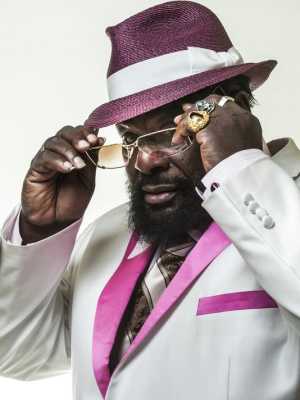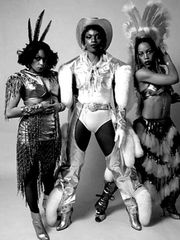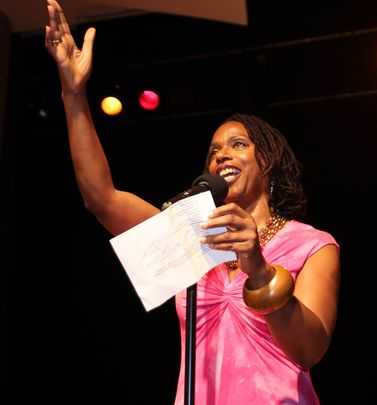|
Taken from Detroit Free Press (November 3, 2015)
Funkmaster George Clinton tells true tales at DIA
Chatting with funkmaster George Clinton, who comes home for storytelling event at Detroit Institute of Arts
by Cassandra Spratling, Detroit Free Press

(Photo: William Thoren) |
Today most people know Detroit's Satori Shakoor as a famed storyteller, the dynamo behind the Secret Society of Twisted Storytellers, an award-winning theatrical series that has breathed new life into an age-old art form.
The true tales, told live, mostly by everyday people, have left audiences laughing and crying — sometimes from the same story.
The stories, Shakoor will tell you, are meant to connect us to each other, and sometimes to reconnect us to ourselves. The mission to break down barriers between people, between races, between institutions — one story at a time — drives Shakoor.
But that’s today.
Back in the day, if you didn’t know Shakoor’s name, you certainly knew her sultry voice, and the look of the women who performed so well as backup singers for the Parliament-Funkadelic machine. P-Funk mastermind George Clinton even moved the women from the background to the foreground as the Brides of Funkenstein, whose music earned fame in its own right.
Shakoor was one of them.

Brides of Funkenstein, from left to right, Sheila Horne, Satori Shakoor, and Dawn Silva
(Photo: Record company) |
Even many of Shakoor’s friends are surprised to know that she rode the iconic Mothership that took funk around the world — a stage prop so internationally famous a replica of it was built to become part of the Smithsonian's permanent music collection.
Fast-forward more than 30 years, and Shakoor and Clinton will be together again.
This time she’s presenting him.
Funkmaster Clinton will tell “Tales from the Funk” as part of a special performance at the Detroit Institute of Arts on Thursday. The presentation is one of a number of events the DIA is hosting in association with the exhibit of African-American artworks called "30 Americans."
Shakoor was 23 when she auditioned and earned a space on the stage with Clinton and a crew that took funky music into homes and audiences all over the world in the 1970s and '80s. With Clinton’s sidekick, Bootsy Collins, they created an enduring genre of music that helped paved the way for today's hip-hop.
At 74, Clinton’s still making music (“First Ya Gotta Shake the Gate,” a compilation of 33 songs is his latest LP), still performing (Chene Park this past summer), and fighting to ensure he and other funk pioneers receive due credit for the music they created. He recently penned a memoir entitled, “Brothas Be, Yo Like George, Ain’t That Funkin Kinda Hard on You?” written with Ben Greenman (Atria Books, $24.30).
Shakoor overflows with joy that Clinton finally agreed to take a break from his busy schedule to sit and tell stories from his decades in the business — many of them set in Detroit, where they met.
“This is so overwhelming. It is beyond anything I’ve ever dreamed,” Shakoor, 60, says. “George is a master storyteller. He’s a poet. He is a wordsmith. He's a sage, an elder, a griot and it's truly a privilege and an honor to have him here.”

Satori Shakoor of The Secret Society of Twisted Storytellers |
Unlike many storytellers who share prepared pieces of their lives, Clinton’s stories will be impromptu, springing from an interview that Shakoor will conduct during the evening. And impromptu will be appropriate, because that’s largely how he made music, jotting down thoughts and verses that freely flowed from his mind.
In advance of his appearance, Clinton agreed to answer a few questions for us. Below is an edited version of that conversation:
QUESTION: What do music and storytelling have in common?
ANSWER: It’s a reflection of the society in which you live in. It’s a reflection of your times. It’s just like books, novels and paintings. It’s a mirror of what’s going on at the time people are doing it. ... Storytelling or making music, it’s all the same type of thang.
Q: If one of your many songs best tells the story of who you are, which one would it be?
A: Wow! Ha! My life or how I’d like life to be. “One Nation Under a Groove.” That’s the image I’d like to have of the whole planet. One planet under a groove. Everybody dancing together ... a peaceful party."
Q: What keeps you going after all these years?
A: Funk is its own reward. If you like doing what you do, you find the energy to keep doing what you want. I found the energy to keep doing what I wanted to do by stopping doing what I shouldn’t have been doing — smoking crack. Once I quit smoking crack, I had the energy to do my music. ... It feels good to be chasing lines and lyrics, not drugs. ... I’m five years clean now. ... It’s just that I had something else to do. I’d still be doing it if I didn’t have something to fight for. (He’s fighting to get recognition for all the music he and others created.)
Q: You’ve inspired so many musicians. Who inspires you?
A: Every new rapper and singer that comes out doing something I wish I hadda done. From Kendrick Lamar, to Rakim, to Eminem, anybody I hear that does something exceptional that makes me say, “Damn, I wish I had done that," so I got to go back into the workshop.
Q: Whom do you listen to?
A: I bounce all over the Sirius satellite from the 1950s, ’60, '70s, '80s, ‘90s, you know what I’m saying, to the new stuff today. I listen to Drake, Lil Wayne, Ice Cube, Public Enemy, Kendrick Lamar. I listen to all styles of music.

George Clinton greets students and guests at the Detroit Institute of Music Education (DIME) on Friday, Dec. 19, 2014 |
Q: Whom would people be surprised to know you listen to?
A: (Laughs) Miley Cyrus. I went to Taylor Swift’s concert the other day, and it was a really nice show. I listen to anything. If it’s working I want to find out why it’s working. Chief Keef’s “That Shit I Don’t Like” is one of my favorite records. The groove on that reminds me of Funkadelic in the early ‘70s. It reminds me of that same attitude we had.
Q: It’s not just your music, but your words and phrases that stick out in people’s minds, like “Free yo mind and yo ass will follow.” Where does come from?
A: Acid; tripping. But you know, it probably came from somewhere else. You get in a zone, you hook up to something, God or some kind of consciousness, and it guides you along. It just comes out of your mouth.
Q: A lot has changed since you left Detroit. (He now lives in Tallahassee, Fla.) When you come back, where do you like to go?
A: So many of the places I used to hang out are gone. But I like downtown, Greektown, Fishbones.
Q: What advice do you give to up-and-coming artists today?
A: Do the best you can, and then funk it up.
|